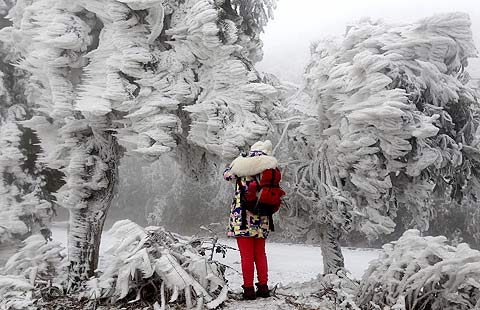Abe's view on history rapped
Updated: 2014-02-13 04:26
By ZHANG YUNBI in Beijing, CAI HONG in Tokyo, CHEN WEIHUA in Washington and YAO QILIN from Xinhua in Seoul (China Daily USA)
|
||||||||
Former Japan PM and Washington Post call to face up to WWII atrocities
Former Japanese Prime Minister Tomiichi Murayama said on Wednesday that Japanese leader Shinzo Abe "has no choice but to honor the Murayama Statement" and urged him to be honest about Japan's wartime aggression.
Murayama's remarks came amid increasing tension in Northeast Asia over Tokyo's reluctance to fully shoulder responsibility for forcing Asian women into sexual slavery during World War II and the Sino-Japanese War. Murayama, 90, is on a three-day tour of South Korea that began on Tuesday.
"All previous prime ministers of Japan said they would inherit the Murayama Statement. Abe has also stated that he would inherit the statement. I believe there has been no falsehood in that pledge," Murayama said during his lecture to South Korean lawmakers at their parliamentary headquarters.
During his time in office in 1995, he made an official apology called the "Murayama Statement" that takes responsibility for Japan's past atrocities and wartime aggression during its colonial rule.
In that August 15, 1995, statement, Murayama said Japan, through its colonial rule and aggression, caused tremendous damage and suffering to the people of many countries, particularly to those of Asian nations.
"In the hope that no such mistake be made in the future, I regard, in a spirit of humility, these irrefutable facts of history, and express here once again my feeling of deep remorse and state my heartfelt apology," the statement said.
Qu Xing, president of the China Institute of International Studies, warned that the current Japanese government has sought opportunities to deny the nation's wartime crimes.
"Several prominent figures in Japanese politics have publicly defended the so-called legitimacy and necessity of forcing women into sexual slavery in times of war, saying that many nations had also done the same thing," Qu said.
Abe also stunned the international community last May when he told the Japanese parliament that "so far there has been no unified definition of ‘aggression'", referring to Japan's actions during WWII.
In an editorial entitled "Japan's denialism" on Wednesday, the Washington Post said Abe should condemn the dangerous rewriting of history.
The editorial blasted comments made by leaders of Japan's public broadcasting network, NHK, on the whitewash of the "comfort women" issue and the denial of the Nanjing Massacre, which killed 300,000 Chinese civilians and unarmed soldiers.
NHK board member Naoki Hyakuta, appointed by Abe, also said recently the US staged its trials of alleged Japanese war criminals after Japan's defeat in 1945 to cover up US war crimes. The US embassy in Tokyo has called these remarks "preposterous."
"Why can't Japan's government bring itself to condemn these comments with equal clarity?" the Post asked.
While Japanese officials have often used "freedom of speech" to ignore the condemnation from neighboring countries about Japan's attempts to rewrite or sugarcoat WWII history, the Post said Abe's responsibility in the NHK case is especially heavy because he appointed both Hyakuta and NHK chairman Katsuto Momii, who made outrageous comments lately.
It said US officials are wondering whether Abe is primarily a nationalist or primarily a reformer. "Only he can make clear whether he supports an independent press and rejects destructive historical denialism," said the Post, which had run several editorials in the past year criticizing Abe's view of history.
Yang Bojiang, deputy director of the Institute of Japan Studies at the Chinese Academy of Social Sciences, said "it is unlikely" that Abe will reverse course on the comfort women controversy because of his perspective on the history of WWII.
On Wednesday, a group of Filipino women, including some who were victims of sexual abuse by the Japanese army during WWII, staged a protest outside the Japanese embassy in Manila, demanding justice.
South Korean President Park Geun-hye said in a January interview with CNN that she "hopes the current Japanese leaders will make sure they inherit the Murayama and the Kono statements and refrain from words and acts that put their sincerity into doubt".
The Kono statement refers to remarks made by Japan's Chief Cabinet Secretary Yohei Kono in 1993 when he acknowledged Japanese military's direct and indirect involvement in the "comfort women."
Murayama said he was assured that Abe would recognize the Murayama Statement because he cannot deny Japan's past invasions. He added that anyone who denies the Murayama Statement should resign from his Cabinet post.
The Associated Press reported on Wednesday that time is running out for aging former comfort women of South Korea to receive compensation. It also reported that "anger in Seoul is (being) met with frustration in Tokyo".
"The Japanese seem to be of the view that whatever they do will not be enough to satisfy the Koreans, so why bother?" Ralph Cossa, president of the Pacific Forum CSIS think tank in Hawaii, told AP.
On Tuesday, Murayama met three South Korean women who were forced into sexual slavery at a Japanese military brothel during WWII. Murayama became the first former Japanese prime minister to meet with the former "comfort women".

 Highlights of Singapore Airshow
Highlights of Singapore Airshow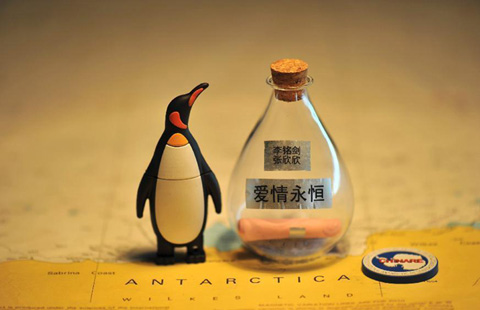
 Sailors of Xuelong release 'love drift bottles'
Sailors of Xuelong release 'love drift bottles'
 Free 3D painting show for Lantern Festival
Free 3D painting show for Lantern Festival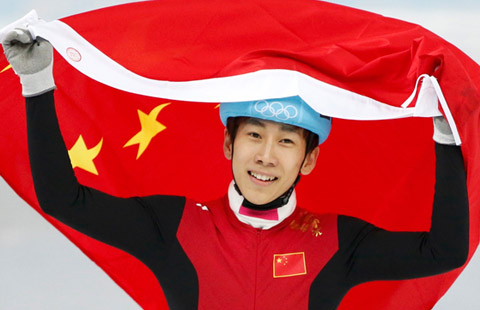
 China takes first Sochi medal on short track
China takes first Sochi medal on short track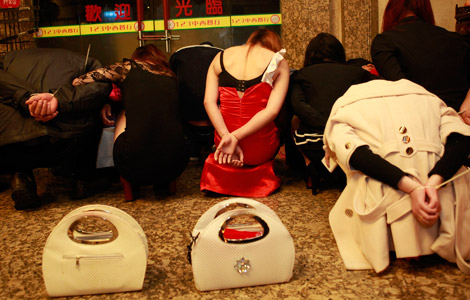
 Guangdong set to slam underground prostitution
Guangdong set to slam underground prostitution
 Giraffe shot and dismembered in Copenhagen Zoo
Giraffe shot and dismembered in Copenhagen Zoo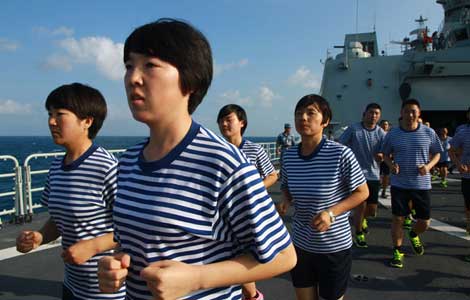
 Women empowered by PLA careers
Women empowered by PLA careers
 Polar bears hug
Polar bears hug
Most Viewed
Editor's Picks

|

|

|

|

|
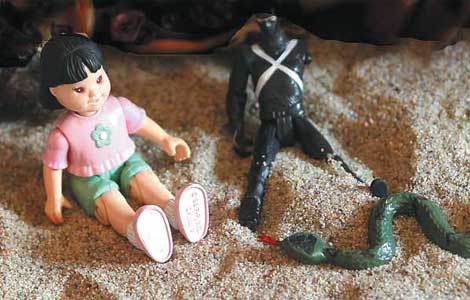
|
Today's Top News
Chinese consume too much food from animals
Obama to visit four Asian countries in April
Jade rabbit comes back to life
Embassy in talks over arrest
Beijing low on list of green cities
No casualties reported in Xinjiang quake
Abe's view on history rapped
Prostitution crackdown expands in Guangdong
US Weekly

|

|


